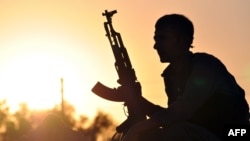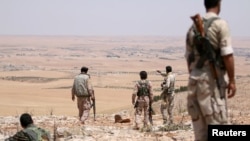The recent killings of two Turkmen anti-Islamic State commanders in northern Syria is raising concerns about how conflicts between competing military forces are impacting the continued fight against IS.
"These kinds of incidents complicate the effort against IS," said Talal Silo, the spokesman for U.S.-backed Syrian Democratic Forces (SDF), one of at least four militias fighting IS.
Several groups – Kurds, tribal Turkmen and Turkish-backed rebels – control parts of northern Syria after IS fighters were driven out of border areas in recent weeks.
And while the varying forces vow to chase IS from areas further south, they have an uneasy détente and sometimes attack one another. There is great mistrust among the competing forces and that schism has grown with the killing of the Turkmen commanders, officials from the various forces say.
Hani al-Mulla, the Turkmen commander of the Seljuk Brigade, was killed last week by unknown assailants. He led fighters primarily based near the IS-held town of al-Bab who have joined with SDF to fight IS. His death came less than a month after another Turkmen commander, Abdulsettar al-Jaddir, was killed on the day he became chairman of a local military council aligned with the pro-Kurdish People's Protection Units, known as YPG.
Turkmen are an ethnic Turkish minority and have lived scattered throughout the Middle East for centuries.
Both men opposed Turkey's decision to send military forces into northern Syria last month to back elements of the Free Syrian Army (FSA). Turkish officials said the incursion is targeting both IS and the YPG. Ankara accuses the Kurdish militia of being terrorists linked to the outlawed PKK Kurdish rebel group and of seeking to carve out an independent state on Turkey's border.
Some point finger at Turkey, others at IS
There is no regional law enforcement authority to investigate the Turkmen murders, though SDF commanders say they are looking for suspects. Suspicion ranges from the involvement of Turkish intelligence -or Turkish-backed rebels - to IS, according to sources in the region.
"Turkey has been involved in some assassinations before, but we are not able to come to conclusion that the Turkish National Intelligence is behind the killing of al-Mulla," said SDF spokesman Silo.
Ilhan Tanir, a freelance Turkish journalist, told VOA that Turkey is trying to break up the SDF and increase support for the FSA which Ankara directly backs.
"I think the killings of two commanders have dealt a blow to the SDF and the fight against IS," he said. "They were against Turkish operation and have been removed. This gives an impression to me that Turkish interests are served."
There has been no official comment from Ankara on the murders.
But the Turkmen commanders were also responsible for leading battles against IS that killed many IS fighters – a motive for a possible revenge from IS.
"According to what I have heard from my sources it was the Islamic State terrorists that assassinated al-Mulla," Abdurrahman Mustafa, the former chairman of the Syrian Turkmen Assembly, said of one of the slain commanders.
Al-Mulla was known for his ability to bring different groups together to form a more powerful alliance in the fight against IS. He was reportedly coordinating with Arab and Kurdish units within the SDF and his death leaves a vacuum.
Semir Hafiz, a Syrian Turkmen leader said despite the killings of two commanders "the fight against IS is moving forward."
And Turkmen leader Mustafa said the addition of Turkey's military - and rebels it backs - will only help against IS.
"With ongoing Turkish operations, now there are concrete gains on the ground against IS," he said.
VOA's Sirwan Kajjo and Mutlu Civiroglu contributed to this report.





